Link (Archive)
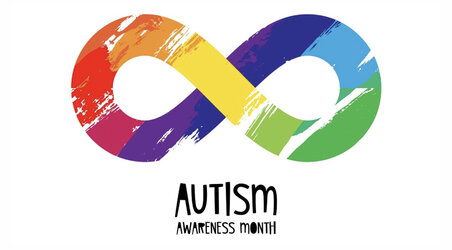
World Autism Awareness Month has arrived, meaning both those within and outside of the autism community will increase their efforts to raise awareness for and promote acceptance of autism. However, while advocating, it’s important to note that one associated symbol has grown outdated.
It’s common during World Autism Awareness Month for social media posts, merchandise, and posters to feature a puzzle piece symbol, which is meant to represent autism. Many individuals in the community, though, have begun asking for people to refrain from using puzzle-piece imagery. In place of the puzzle piece, a new symbol has arisen to represent autism: a rainbow-colored infinity sign.
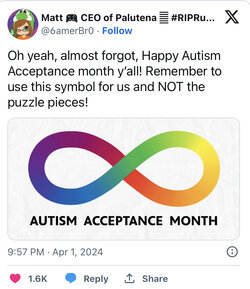
For many years, the Autism Awareness Month symbol was a ribbon made out of rainbow-colored interlocking puzzle pieces. The controversial but extremely prominent organization Autism Speaks also adopted the puzzle concept as its logo, which is a single multi-colored puzzle piece. As a result, many began to associate puzzle pieces as a symbol of autism itself. Hence, it’s understandable that some may be confused about the change and why the puzzle piece symbol was in need of an update.
The symbol was meant to represent the “puzzling” nature of autism and quickly became the official logo of the NAS. By 1999, the Autism Society of America adopted the puzzle piece concept and introduced the popularized autism awareness symbol of the ribbon made of puzzle pieces. However, this society is one of the most controversial in the nation, as it has emphasized trying to “cure” autism instead of promoting acceptance of autism. It has even gone as far as to promote harmful methods of “treating” autism, such as chelation therapy, and spread misinformation about vaccines causing autism.
Soon, Autism Speaks, which was founded in 2005, also grasped the concept of the puzzle piece, making its logo a single puzzle piece that is purple and blue. According to their website, “The puzzle piece, with its current spectrum of colors, is meant to be representative of the spectrum of perspectives and experiences autistic people may have.” Not coincidentally, this organization also has a sordid history, given its framing of autism as a “disease” that needs a cure and the release of commercials that raise further fear and stigma around autism.
Most importantly, many in the autism community have spoken out to confirm that they don’t feel the puzzle piece defines them. Paula Jessop, who has autism and once served as Altogether Autism’s advisor, summarized the problems with the puzzle piece symbol. She acknowledged that the puzzle piece is a reminder of the harm done by Autism Speaks, stating, “Autistic people find the puzzle piece a reminder of an organization that spent years running very public campaigns in America that framed autism as a tragic disease. To autistic people, the puzzle piece represents negativity about autism, not a positive perspective of autism.”
Secondly, she pointed out how the puzzle piece often reinforces the idea that there’s something “puzzling” or “mysterious” about individuals with autism. Jessop writes, “For autistic people, this is problematic, as we don’t wish to be viewed as akin to a puzzle that can’t be worked out.” She also explains that one may assume a person or organization using this symbol either did not consult with the neurodivergent community or disregarded their feelings. On social media, many other individuals with autism have expressed similar views to Jessop, criticizing that the symbol can be interpreted as them being incomplete or that autism needs to be “solved.”
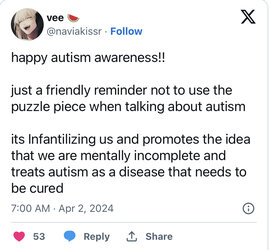
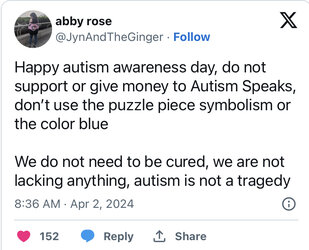
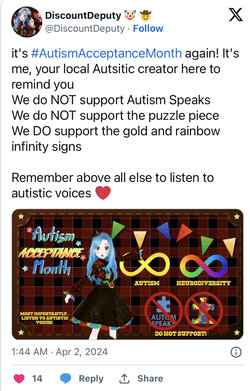
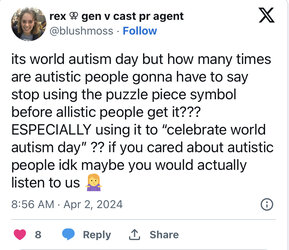
A common alternative to the puzzle piece is the rainbow infinity symbol. According to Cross River Therapy, “The rainbow represents the spectrum of autism, highlighting the wide range of strengths, challenges, and characteristics within the community. It promotes the idea that all individuals, regardless of where they fall on the spectrum, should be accepted and valued for who they are.”
Another variation of this concept is the gold infinity symbol. Ultimately, the problem with the puzzle piece is that those outside the autism community, including many who held negative views on autism, decided it represented autism. It’s important that the autistic community decide for themselves what represents them. If you are unsure of what symbol to use, you can always reach out to an organization like the Autistic Self Advocacy Network or consult someone you know who has autism for input.
Why You Should Reconsider Using a Puzzle Piece Symbol for Autism Awareness Month

World Autism Awareness Month has arrived, meaning both those within and outside of the autism community will increase their efforts to raise awareness for and promote acceptance of autism. However, while advocating, it’s important to note that one associated symbol has grown outdated.
It’s common during World Autism Awareness Month for social media posts, merchandise, and posters to feature a puzzle piece symbol, which is meant to represent autism. Many individuals in the community, though, have begun asking for people to refrain from using puzzle-piece imagery. In place of the puzzle piece, a new symbol has arisen to represent autism: a rainbow-colored infinity sign.

For many years, the Autism Awareness Month symbol was a ribbon made out of rainbow-colored interlocking puzzle pieces. The controversial but extremely prominent organization Autism Speaks also adopted the puzzle concept as its logo, which is a single multi-colored puzzle piece. As a result, many began to associate puzzle pieces as a symbol of autism itself. Hence, it’s understandable that some may be confused about the change and why the puzzle piece symbol was in need of an update.
The puzzle piece symbol’s questionable origins
The puzzle piece symbol first came into use in 1963, when it was designed by Gerald Gasson, a parent and board member for the National Autistic Society in the UK. The original design was very different from the design ultimately adopted by Autism Speaks and for Autism Awareness Month. Back then, it was a half-green, half-black puzzle piece; in the center of it was an illustration of a child crying. Gasson was not a member of the neurodivergent community, although he was a father to a child with autism.The symbol was meant to represent the “puzzling” nature of autism and quickly became the official logo of the NAS. By 1999, the Autism Society of America adopted the puzzle piece concept and introduced the popularized autism awareness symbol of the ribbon made of puzzle pieces. However, this society is one of the most controversial in the nation, as it has emphasized trying to “cure” autism instead of promoting acceptance of autism. It has even gone as far as to promote harmful methods of “treating” autism, such as chelation therapy, and spread misinformation about vaccines causing autism.
Soon, Autism Speaks, which was founded in 2005, also grasped the concept of the puzzle piece, making its logo a single puzzle piece that is purple and blue. According to their website, “The puzzle piece, with its current spectrum of colors, is meant to be representative of the spectrum of perspectives and experiences autistic people may have.” Not coincidentally, this organization also has a sordid history, given its framing of autism as a “disease” that needs a cure and the release of commercials that raise further fear and stigma around autism.
Why the autism puzzle piece is controversial
Reading its history, one can immediately see several problems with the autism puzzle piece symbol. For one, it’s hard to say it accurately reflects the autistic community when a neurotypical individual created it. While parents of autistic children certainly can have valuable insights and perspectives, it can’t be for them to decide what is the best representation or framing of autism. Meanwhile, every time one promotes the puzzle piece symbol, it can be seen as promoting the two controversial organizations that further popularized Gasson’s concept.Most importantly, many in the autism community have spoken out to confirm that they don’t feel the puzzle piece defines them. Paula Jessop, who has autism and once served as Altogether Autism’s advisor, summarized the problems with the puzzle piece symbol. She acknowledged that the puzzle piece is a reminder of the harm done by Autism Speaks, stating, “Autistic people find the puzzle piece a reminder of an organization that spent years running very public campaigns in America that framed autism as a tragic disease. To autistic people, the puzzle piece represents negativity about autism, not a positive perspective of autism.”
Secondly, she pointed out how the puzzle piece often reinforces the idea that there’s something “puzzling” or “mysterious” about individuals with autism. Jessop writes, “For autistic people, this is problematic, as we don’t wish to be viewed as akin to a puzzle that can’t be worked out.” She also explains that one may assume a person or organization using this symbol either did not consult with the neurodivergent community or disregarded their feelings. On social media, many other individuals with autism have expressed similar views to Jessop, criticizing that the symbol can be interpreted as them being incomplete or that autism needs to be “solved.”




A common alternative to the puzzle piece is the rainbow infinity symbol. According to Cross River Therapy, “The rainbow represents the spectrum of autism, highlighting the wide range of strengths, challenges, and characteristics within the community. It promotes the idea that all individuals, regardless of where they fall on the spectrum, should be accepted and valued for who they are.”
Another variation of this concept is the gold infinity symbol. Ultimately, the problem with the puzzle piece is that those outside the autism community, including many who held negative views on autism, decided it represented autism. It’s important that the autistic community decide for themselves what represents them. If you are unsure of what symbol to use, you can always reach out to an organization like the Autistic Self Advocacy Network or consult someone you know who has autism for input.

